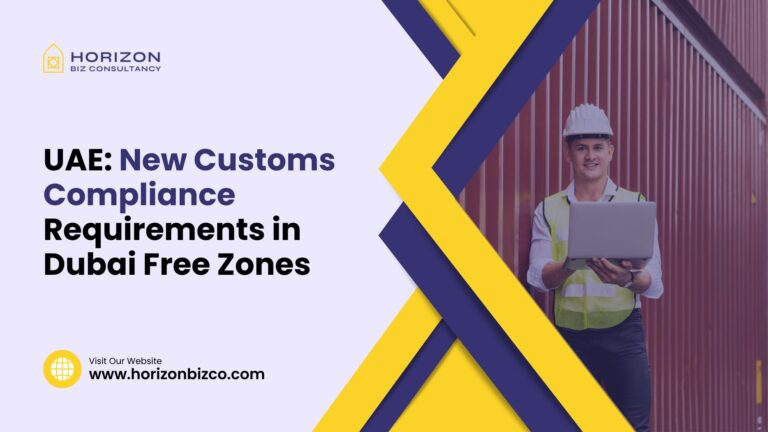There are new customs compliance regulations that companies operating in Dubai’s free zones must adhere to. This guide will explain the key changes, challenges they create, and tips on how to adapt operations to comply.
Why Were the New Customs Regulations Introduced?
Dubai Customs implemented the new rules for these reasons:
- Better Tracking of Cargo: To digitally track goods moving in and out of free zones.
- Enhanced Security: To thoroughly inspect cargo and stop banned/illegal items.
- Control Trade Violations: To reduce customs duty fraud and abuse of temporary admission.
- Mandatory Information Submission: To make companies submit complete data on goods.
- Oversight on Trade Activity: To give Customs visibility on all trade transactions in free zones.
Key Changes in Customs Compliance Requirements
The main changes that companies must comply with are:
Mandatory Registration on Dubai Customs Portal
- All companies operating in free zones must register on the Dubai Customs portal.
- This provides Customs with their business details for oversight.
Strict Reporting and Declarations for Goods Movement
Companies must report detailed information when importing or exporting goods including:
- Product description, codes, and valuation
- Origin and destination
- Duty amounts
- Customs procedure codes
Any errors or incomplete information will lead to penalties
Advanced Cargo Screening and Security Checks
- Goods will undergo increased physical inspections and scans for restricted/prohibited items.
- Customs is enhancing screening to detect banned substances like narcotics and unlawful wildlife trade.
Specific Guidelines for High-Risk Goods
- Special categories like chemicals, pharmaceuticals, weapons, tobacco, etc. have stringentprotocols
- Companies must comply with product-specific rules on labeling, storage, handling, and delivery.
Tighter Restrictions on Temporary Goods Admission
- Goods brought in temporarily for events, exhibitions etc. must be re-exported as per submitted timelines.
- The window for temporary admission is shorter with heavy fines for delays in re-exporting goods.
New Penalties and Fines for Non-Compliance
- Violations of the new rules will incur heavy penalties and fines up to millions of Dirhams.
- Examples include AED 50,000 for incorrect origin data and AED 5,000 for unpaid duties.
Challenges Created by the New Customs Regulations
Complying with the rules poses difficulties in some areas:
Increased Administrative Workload
- More documentation needs to be filed for each shipment – from declarations to screening forms.
- New staff may be needed to handle customs compliance procedures.
Cargo Delays and Supply Chain Disruptions
- With increased scans and checks, cargo clearance will take longer – impacting supply reliability.
- Customers may face order delays leading to penalties on the company.
Complex Handling Rules for High-Risk Goods
- Special category products need staff training to comply with protocols accurately.
- Small mistakes can lead to confiscations, fines, and canceled trade licenses.
Higher Risk of Non-Compliance Penalties
- Even minor gaps in compliance can result in hefty fines that impact profitability.
- Proving compliance burdens falls more on companies now.
Tighter Timeframe for Temporary Admissions
- The shortened window leaves little margin of error in re-exporting temporarily imported goods
- Overstaying goods even by a few days can mean massive fines.
Adapting Operations to the New Customs Environment
Companies can take these steps to comply with the rules:
Register on the Dubai Customs Portal Immediately
- Begin your portal registration even as you read this! Delayed registration itself could lead to penalties.
Review Information Required for Declarations
- Analyze the data Dubai Customs needs for cargo declarations and ensure your ERP system captures it all
Train Employees on Protocols for Special Goods
- Conduct workshops to educate staff on the specific compliance needs for high-risk goods
Streamline Processes to Meet Shorter Admission Deadlines
- Pinpoint stress points and build buffers into cargo flows to re-export temporary goods on time.
Seek Customs Trade Compliance Experts’ Assistance
- Consult specialists to implement robust customs mechanisms that fully meet regulations.
Pad Delivery Timelines to Absorb Cargo Screening Delays
- Revise delivery schedules and contracts to factor in longer customs clearance times.
Conclusion
The new customs regulations in Dubai free zones mandate significant changes to trade operations. Companies must act quickly to comply and leverage experts, or risk major disruption, losses and penalties. With some adaptation of internal processes and bringing in advisors, businesses can effectively align to the new compliance regime. In the long run, the rules will benefit trade through enhanced oversight and security.
FAQS
Fines start at AED 50,000 and go up to millions depending on the specific violation.
Yes, the rules are mandatory for every business operating in Dubai’s free zones.
Chemicals, pharmaceuticals, weapons, alcohol, tobacco, radioactive material, wildlife, oils/lubricants etc.
Registration should be completed urgently within the next few weeks to avoid fines.
Main costs are for specialists, improving IT systems, extra staff, delays, and potential penalties.





